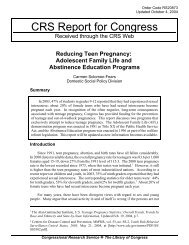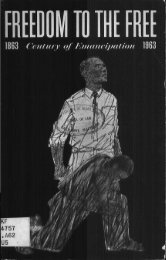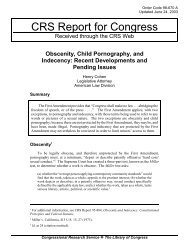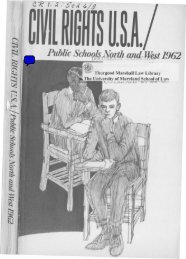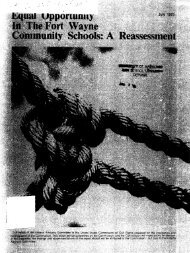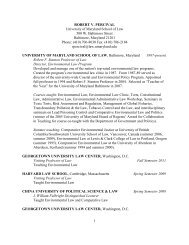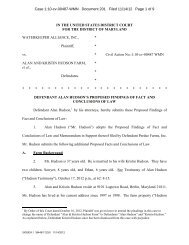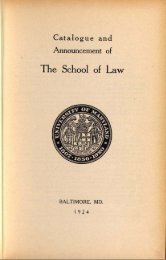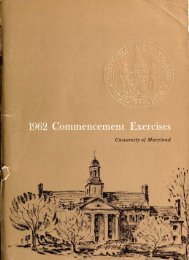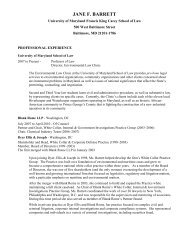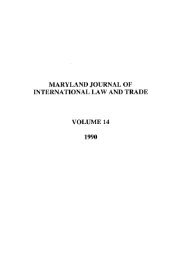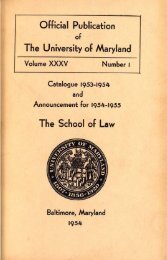University of Maryland School of Law : Catalog, 1988-1989
University of Maryland School of Law : Catalog, 1988-1989
University of Maryland School of Law : Catalog, 1988-1989
You also want an ePaper? Increase the reach of your titles
YUMPU automatically turns print PDFs into web optimized ePapers that Google loves.
Constitutional <strong>Law</strong> Seminar*<br />
(3)<br />
Students study various problems in<br />
constitutional litigation. In addition<br />
to the written work, in the<br />
form <strong>of</strong> a brief suitable for filing in<br />
the Supreme Court and an oral<br />
presentation based on that brief,<br />
members <strong>of</strong> the seminar are expected<br />
to spend substantial time<br />
reading materials <strong>of</strong> their own<br />
choice.<br />
P: Constitutional <strong>Law</strong>.<br />
Day (LAW 510 C)—Mr. Woodey.<br />
Constitutional <strong>Law</strong> Workshop<br />
(2)<br />
The Constitutional <strong>Law</strong> Workshop,<br />
for students enrolled in Constitutional<br />
<strong>Law</strong>, combines discussions <strong>of</strong><br />
constitution law with a practicum<br />
involving simulations and group<br />
writing exercises. Students will<br />
work in groups <strong>of</strong> six. Each student<br />
will act as the senior member <strong>of</strong><br />
the group for one exercise. The exercises<br />
include an opinion for a<br />
case currently pending before the<br />
Supreme Court. Grading is based<br />
primarily on group rather than individual<br />
work, but a portion <strong>of</strong> the<br />
grade will be based on class performance<br />
and greater weight will<br />
be given the exercise for which the<br />
individual student is the senior<br />
member.<br />
Day (LAW 525 D)— Mr. Bogen.<br />
74<br />
Consumer Protection Seminar*<br />
(3)<br />
At the outset, we shall examine<br />
certain fundamental questions such<br />
as: Why do "consumers" need<br />
"protection?" Against whom and<br />
by whom? What motivates the<br />
"protectors?" What is the nature<br />
and extent <strong>of</strong> the "protection?"<br />
How far has the common law been<br />
displaced by statutes and administrative<br />
devices as instruments <strong>of</strong> social<br />
change? With these questions<br />
in mind, we shall examine a complete<br />
range <strong>of</strong> the traditional materials:<br />
the development <strong>of</strong> deceit<br />
from common law through ETC.;<br />
the problems <strong>of</strong> regulating advertising;<br />
truth-in-lending; regulation <strong>of</strong><br />
selling techniques; the role <strong>of</strong> the<br />
lender; debt collection; etc.<br />
DAY (LAW 578 Q— Not <strong>of</strong>fered<br />
<strong>1988</strong>-89.<br />
Contracts I (2) and Contracts<br />
11(3)<br />
These courses focus on agreements<br />
enforceable at law, including requirements<br />
for the formation <strong>of</strong><br />
contracts, consideration and its<br />
substitutes, damages and specific<br />
performance, third-party beneficiaries<br />
and assignees and problems<br />
arising in the performance stage <strong>of</strong><br />
contracts; conditions (constructive<br />
and express), impossibility and<br />
frustration, discharge and illegality.<br />
Day (Contracts I—LAW 500 A)—<br />
Mr. Hornstein; Day (Contracts 11—<br />
LAW 501 A)—Mr. Breitowitz, Mr.<br />
Tomlinson; Evening (Contracts II—<br />
LAW 509 E)—Mr. Bogen.<br />
Corporate Taxation I (3)<br />
This is a study <strong>of</strong> the fundamental<br />
principles <strong>of</strong> the taxation <strong>of</strong> business<br />
corporations and their investors<br />
with emphasis on the organization,<br />
operation and liquidation <strong>of</strong><br />
small business ventures. The course<br />
will cover both subchapter "C" and<br />
subchapter "S" corporations.<br />
C: Business Associations. P: Income<br />
Taxation.<br />
Day (LAW 578 D) and Evening<br />
(LAW 578 J)—Mr. Keller.<br />
Corporate Taxation II (2)<br />
This course will provide an extensive<br />
treatment <strong>of</strong> acquisitive reorganizations,<br />
recapitalizations and<br />
corporate divisions, and the nonrecognition<br />
and basis provisions associated<br />
with such transactions.<br />
The tax treatment <strong>of</strong> affiliated corporations,<br />
including the special<br />
problem <strong>of</strong> consolidated returns,<br />
will also be covered.<br />
P: Business Associations, Corporate<br />
Taxation 1, Income Taxation.<br />
Day (LAW 589 C)— Mr. D. Goldberg.<br />
Corporate Tax Workshop (1)<br />
Enrollment is limited to those concurrently<br />
enrolling in Corporate<br />
Tax II. The class will meet 6 or 7<br />
times during the semester. Students<br />
will work in one or more simulated<br />
problems in corporate tax, including<br />
elements <strong>of</strong> tax planning.<br />
Day (LAW 531 D)— Mr. D. Goldberg.



